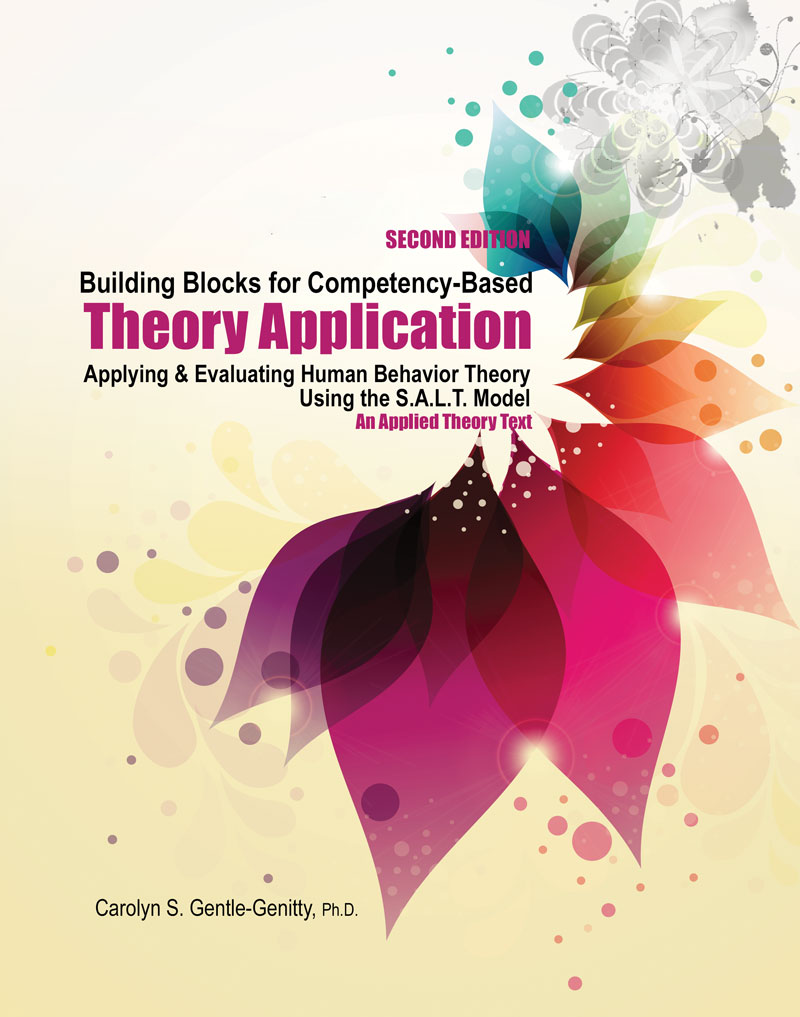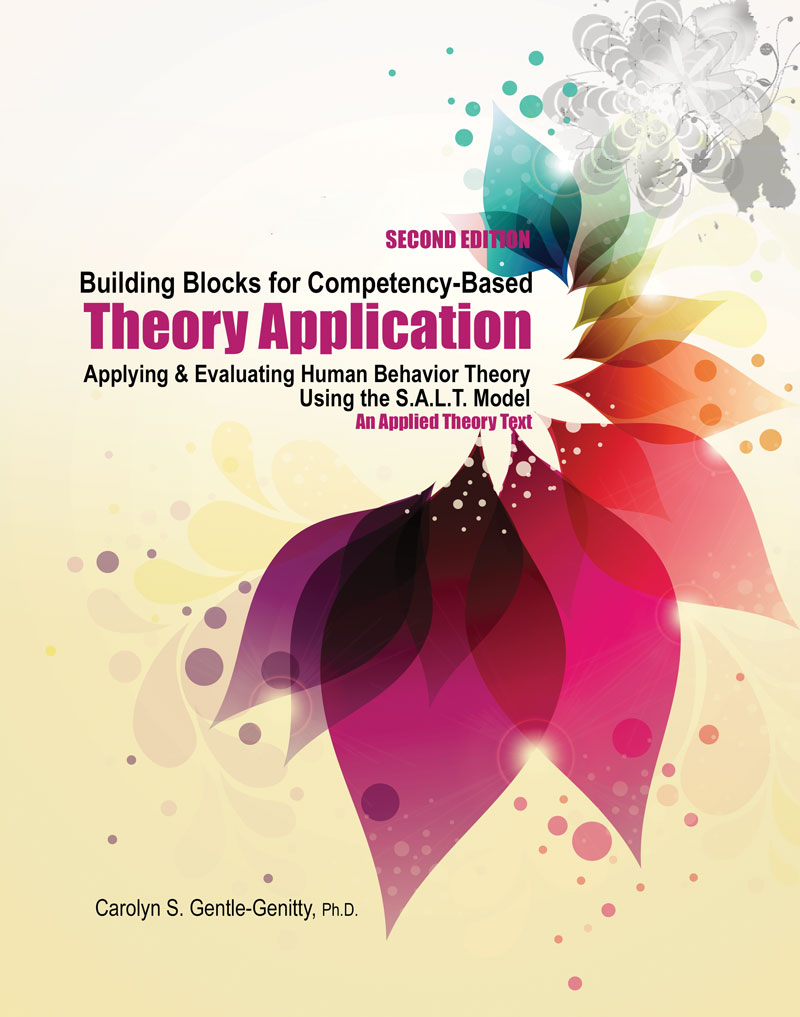Building Blocks for Competency-Based Theory Application: Applying & Evaluating Human Behavior Theory Using the S.A.L.T. Model - An Applied Theory Text
Author(s): Carolyn Gentle-Genitty
Edition: 2
Copyright: 2017
Pages: 214
Edition: 2
Copyright: 2017
Pages: 214
This book was written and intended for use by bachelors and masters level social work students as a tool for Human Behavior and the Social Environment (HBSE) course(s). It is meant to be a book of applied HBSE and not a dictionary approach to theory.
Building Blocks for Competency-Based Theory Application: Applying & Evaluating Human Behavior Theory Using the S.A.L.T. Model: An Applied Theory expects learners to showcase knowledge and comprehension
outcomes in:
• Identifying and defining three levels of practice theories.
• Listing and defining at least five theories and perspectives that explain human behavior including
structural functionalism, ecological theory, systems theory, strengths perspective, empowerment
theory, feminist theories, and developmental and attachment theories.
• Describing the value base underlying a broad range of theories of human behavior.
• Compiling a list of epistemological assumptions of human behavior theories.
• Illustrating the mechanisms by which persons of color, women, lesbian women and gay men, and
groups distinguished by age, ethnicity, culture, class, religion, region, and physical or mental ability
are oppressed using theory dialogue and essay.
UNIT I FOUNDATION
CHAPTER 1 Setting the Foundation
Introduction
Setting the Foundation
Defining Knowledge
Defining Theory Knowledge
Purposes of Theory
Defining Social Work and Its Purpose
Strengths Perspective
Understanding the Process of Theory and Theory Evolution
The Generalist Practitioner and the Seasoned Practitioner
Coming Up Next
Exercise 1
CHAPTER 2 Understanding Theory
What Is a Theory?
Theory Development
Differences Between Paradigms, Perspectives, and Models
Why Apply Theory?
Historical Context of Theory in Social Work
Theory Benefits
Theory Harm
How to Apply Theory
Guiding Theory Application
Coming Up Next
Exercise 2
CHAPTER 3 Researching and Evaluating Theory
Overview
Researching Theory
Two Approaches to Theory Creation
Why Research Theory?
How to Research a Theory
What to Look for when You Research a Theory
Evaluating Theory
Strengths of Theory
Area of Focus of the Theory
Limitations of the Theory
Theories to Redress for Shortcoming
Time in the Change Process Theory Is Most Effective
Coming Up Next
Exercise 3
CHAPTER 4 Critical Thinking
Overview
Critical Thinking Defined
Critical Thinking Importance
Defining and Identifying Critical Thinking Fallacies
Characteristics of Critical Thinking
Avoiding Critical Thinking Errors
Coming Up Next
Exercise 4
CHAPTER 5 SALT 4-Prong Approach
Models
Benefits of Using Models to Teach
SALT Method of Theory Evaluation in HBSE
Human Behavior Theories
Description of the SALT Model
Strengths
Areas of Focus
Limitations
Theories to redress for Shortcoming
Coming up Next
Exercise 5
UNIT II APPLYING AND ANALYZING THEORY
CHAPTER 6 Analysis Of Theory: Turner’s Framework Reviewed
Overview
Turner Framework
Questions that Guide the Turner Framework
Benefits of Questioning in Theory Analysis
Coming Up Next
Exercises 6.1
Exercises 6.2
CHAPTER 7 Understanding Theory Application
Understanding How to Apply Theory
Define the Role of a Social Worker in the Client–Social Worker
Relationship
Five Phases of Theory Application
Theory Approach
Theory Assessment
Theory Intervention
Theory Case Plan
Theory Termination
Developing an Integrative Case Plan for Work with a Client
Coming Up Next
CHAPTER 8 Exploring Theory Context
Theory Practice Contexts
Understanding Theories at Three Main System Levels
Micro System
Mezzo System
Macro System
Pointing Out Theory in Everyday Life
Coming Up Next
Exercise 8
CHAPTER 9 Critical Perspective and Integrative Approach
The Just Practice Framework (Finn & Jacobson)
Just Practice Framework Specifics
Resilience Perspective
Defining Resiliency
Different Types and Components of Resiliency
Exploring the Basic Concepts of Resiliency: Risk and Protective Factors
Coming Up Next
UNIT III LEARNING ABOUT THEORY GROUPS
CHAPTER 10 Individual Theories
Individual Theories
The Dual Perspective
Life-Span Development Theories
Attachment Theory
Empowerment Theory
Feminist Theories
Symbolic Interaction
Coming up Next
CHAPTER 11 Group Theories
Traditional and Alternative Perspectives of Groups
Types of Groups
Aspects Hindering Group Development
More on Groups
Definitions
Sequential Stage Theories (Tuckman & Jensen, 1977)
Sequential Stage Model (Douglasson & Douglasson, 1991)
Membership
Traditional and Alternative Perspectives
Theories that Guide Work with Group/Group Theories
Conflict Theories
Role Theory
Ecological Theories
Coming Up Next
CHAPTER 12 The New Family—Family Theories
Overview
The New Family
Family ROLES Have Changed
Discipline Functions
Guidance Functions
Nurturing Functions
Accessibility Functions
Approaches to Understand “Familiness”
Understanding Family in Regard to Space/Place/Meaning
Life Course Theory
Theoretical Views of Family
Structural Functional Theory
Psychoanalytic/Social Learning Theories
Social Exchange Theory
Developmental Approach
Six Counseling Intervention Models with Families
Experiential Model
Transgenerational Model
Structural Model
Strategic Model
Milan Model
Social Constructionist Model
Tailoring Techniques to Couples and Families by . . . Diagnosis, Relational
Conflict, or Family Functioning
Diagnosis
Relational Conflict
Family Functioning
Underlying Issues to Explore and Clarify in Basic Generalist
Family Counseling
Type of Family
Theory Relation to Family—Understanding Family Behaviors
Other Theories
Assessment
Continuous Goal of Family Sessions
Map out Work with Family—Appraisal Process
Coming up Next
CHAPTER 13 Organizational Theories
Overview
Aspects of Organizational Development
Organizational Life Cycle
Organizational Climate
Human Relations
Types of Organizations
Aspects of Traditional Organizations
Alternative Organization: Total Quality Management (TQM) Consensus
Characteristics of Bureaucracy
Theories of Organization
McGregor Theory X
McGregor Theory Y
Ouchi Theory Z
Systems Theory
Structural Functionalism
Empowerment Theory
Behaviorism Theories
Social Learning Theory
Exchange Theory
Contingency Theory
Coming up Next
CHAPTER 14 Community and Theories
Understanding Community
Alternative View of Community
Eight Community-Building Principles
Community Theory Generalist Discussion
System Theories
Anderson and Carter (1990) (Fundamental Aspects of Systems Theory)
Resiliency and Community
Coming up Next
Exercise 14
UNIT IV ASSESSMENT AND EVALUATION OF LEARNING
CHAPTER 15 Bringing it all Together and Assessment
Case Work Practice: Bringing It All Together
How to Evaluate Your Practice
Tools for the Assessment
Assessments Purposes
Caveats in Assessment
Recognizing Success in Social Work
Practice Evaluation
Three Types of Practice Evaluation
Key Assessment Questions for Any Program
Assessing Client’s Feedback
Intervention Techniques
Contracting Intervention
Types of Interventions
Problem Solving Skills
Intervention with African American Families
Intervention with Hispanic American Families
Eco-Map Exercise
Checklist for Genogram Evaluation
References
APPENDICES
APPENDIX A CASE SCENARIOS
APPENDIX B SAMPLE AGENDA
APPENDIX C EXERCISES
APPENDIX D DEBATE PROCESS AND HANDOUT
APPENDIX E SAMPLE SALT 4-PRONG APPROACH
APPENDIX F SAMPLE TURNER FRAMEWORK EVALUATION
APPENDIX G SHORT LIST OF HBSE THEORIES
APPENDIX H GOAL ATTAINMENT SCALE
Carolyn Gentle-Genitty received her PhD from Indiana University and her Bachelor and Master degrees from Spalding University in Louisville KY. She is originally from Belize and brings extensive lead- ership and programmatic experience from over 20+ years in the field of Youth Development locally and internationally serving as Executive Director of a YMCA and Chair of numerous volunteer, non-profit, and governmental organizations. Gentle-Genitty also served as a youth consultant for Belize and UNICEF. She taught at the University of Belize for 5 years prior to IU. Her areas of interests within the academic set- ting include teaching and teaching effectiveness, theory application, online learning, millennial, and student engagement. Dr. Gentle-Genitty was appointed recently to the new role of Indiana University Assistant Vice President for University Policy and Director of the University Transfer Office.
This book was written and intended for use by bachelors and masters level social work students as a tool for Human Behavior and the Social Environment (HBSE) course(s). It is meant to be a book of applied HBSE and not a dictionary approach to theory.
Building Blocks for Competency-Based Theory Application: Applying & Evaluating Human Behavior Theory Using the S.A.L.T. Model: An Applied Theory expects learners to showcase knowledge and comprehension
outcomes in:
• Identifying and defining three levels of practice theories.
• Listing and defining at least five theories and perspectives that explain human behavior including
structural functionalism, ecological theory, systems theory, strengths perspective, empowerment
theory, feminist theories, and developmental and attachment theories.
• Describing the value base underlying a broad range of theories of human behavior.
• Compiling a list of epistemological assumptions of human behavior theories.
• Illustrating the mechanisms by which persons of color, women, lesbian women and gay men, and
groups distinguished by age, ethnicity, culture, class, religion, region, and physical or mental ability
are oppressed using theory dialogue and essay.
UNIT I FOUNDATION
CHAPTER 1 Setting the Foundation
Introduction
Setting the Foundation
Defining Knowledge
Defining Theory Knowledge
Purposes of Theory
Defining Social Work and Its Purpose
Strengths Perspective
Understanding the Process of Theory and Theory Evolution
The Generalist Practitioner and the Seasoned Practitioner
Coming Up Next
Exercise 1
CHAPTER 2 Understanding Theory
What Is a Theory?
Theory Development
Differences Between Paradigms, Perspectives, and Models
Why Apply Theory?
Historical Context of Theory in Social Work
Theory Benefits
Theory Harm
How to Apply Theory
Guiding Theory Application
Coming Up Next
Exercise 2
CHAPTER 3 Researching and Evaluating Theory
Overview
Researching Theory
Two Approaches to Theory Creation
Why Research Theory?
How to Research a Theory
What to Look for when You Research a Theory
Evaluating Theory
Strengths of Theory
Area of Focus of the Theory
Limitations of the Theory
Theories to Redress for Shortcoming
Time in the Change Process Theory Is Most Effective
Coming Up Next
Exercise 3
CHAPTER 4 Critical Thinking
Overview
Critical Thinking Defined
Critical Thinking Importance
Defining and Identifying Critical Thinking Fallacies
Characteristics of Critical Thinking
Avoiding Critical Thinking Errors
Coming Up Next
Exercise 4
CHAPTER 5 SALT 4-Prong Approach
Models
Benefits of Using Models to Teach
SALT Method of Theory Evaluation in HBSE
Human Behavior Theories
Description of the SALT Model
Strengths
Areas of Focus
Limitations
Theories to redress for Shortcoming
Coming up Next
Exercise 5
UNIT II APPLYING AND ANALYZING THEORY
CHAPTER 6 Analysis Of Theory: Turner’s Framework Reviewed
Overview
Turner Framework
Questions that Guide the Turner Framework
Benefits of Questioning in Theory Analysis
Coming Up Next
Exercises 6.1
Exercises 6.2
CHAPTER 7 Understanding Theory Application
Understanding How to Apply Theory
Define the Role of a Social Worker in the Client–Social Worker
Relationship
Five Phases of Theory Application
Theory Approach
Theory Assessment
Theory Intervention
Theory Case Plan
Theory Termination
Developing an Integrative Case Plan for Work with a Client
Coming Up Next
CHAPTER 8 Exploring Theory Context
Theory Practice Contexts
Understanding Theories at Three Main System Levels
Micro System
Mezzo System
Macro System
Pointing Out Theory in Everyday Life
Coming Up Next
Exercise 8
CHAPTER 9 Critical Perspective and Integrative Approach
The Just Practice Framework (Finn & Jacobson)
Just Practice Framework Specifics
Resilience Perspective
Defining Resiliency
Different Types and Components of Resiliency
Exploring the Basic Concepts of Resiliency: Risk and Protective Factors
Coming Up Next
UNIT III LEARNING ABOUT THEORY GROUPS
CHAPTER 10 Individual Theories
Individual Theories
The Dual Perspective
Life-Span Development Theories
Attachment Theory
Empowerment Theory
Feminist Theories
Symbolic Interaction
Coming up Next
CHAPTER 11 Group Theories
Traditional and Alternative Perspectives of Groups
Types of Groups
Aspects Hindering Group Development
More on Groups
Definitions
Sequential Stage Theories (Tuckman & Jensen, 1977)
Sequential Stage Model (Douglasson & Douglasson, 1991)
Membership
Traditional and Alternative Perspectives
Theories that Guide Work with Group/Group Theories
Conflict Theories
Role Theory
Ecological Theories
Coming Up Next
CHAPTER 12 The New Family—Family Theories
Overview
The New Family
Family ROLES Have Changed
Discipline Functions
Guidance Functions
Nurturing Functions
Accessibility Functions
Approaches to Understand “Familiness”
Understanding Family in Regard to Space/Place/Meaning
Life Course Theory
Theoretical Views of Family
Structural Functional Theory
Psychoanalytic/Social Learning Theories
Social Exchange Theory
Developmental Approach
Six Counseling Intervention Models with Families
Experiential Model
Transgenerational Model
Structural Model
Strategic Model
Milan Model
Social Constructionist Model
Tailoring Techniques to Couples and Families by . . . Diagnosis, Relational
Conflict, or Family Functioning
Diagnosis
Relational Conflict
Family Functioning
Underlying Issues to Explore and Clarify in Basic Generalist
Family Counseling
Type of Family
Theory Relation to Family—Understanding Family Behaviors
Other Theories
Assessment
Continuous Goal of Family Sessions
Map out Work with Family—Appraisal Process
Coming up Next
CHAPTER 13 Organizational Theories
Overview
Aspects of Organizational Development
Organizational Life Cycle
Organizational Climate
Human Relations
Types of Organizations
Aspects of Traditional Organizations
Alternative Organization: Total Quality Management (TQM) Consensus
Characteristics of Bureaucracy
Theories of Organization
McGregor Theory X
McGregor Theory Y
Ouchi Theory Z
Systems Theory
Structural Functionalism
Empowerment Theory
Behaviorism Theories
Social Learning Theory
Exchange Theory
Contingency Theory
Coming up Next
CHAPTER 14 Community and Theories
Understanding Community
Alternative View of Community
Eight Community-Building Principles
Community Theory Generalist Discussion
System Theories
Anderson and Carter (1990) (Fundamental Aspects of Systems Theory)
Resiliency and Community
Coming up Next
Exercise 14
UNIT IV ASSESSMENT AND EVALUATION OF LEARNING
CHAPTER 15 Bringing it all Together and Assessment
Case Work Practice: Bringing It All Together
How to Evaluate Your Practice
Tools for the Assessment
Assessments Purposes
Caveats in Assessment
Recognizing Success in Social Work
Practice Evaluation
Three Types of Practice Evaluation
Key Assessment Questions for Any Program
Assessing Client’s Feedback
Intervention Techniques
Contracting Intervention
Types of Interventions
Problem Solving Skills
Intervention with African American Families
Intervention with Hispanic American Families
Eco-Map Exercise
Checklist for Genogram Evaluation
References
APPENDICES
APPENDIX A CASE SCENARIOS
APPENDIX B SAMPLE AGENDA
APPENDIX C EXERCISES
APPENDIX D DEBATE PROCESS AND HANDOUT
APPENDIX E SAMPLE SALT 4-PRONG APPROACH
APPENDIX F SAMPLE TURNER FRAMEWORK EVALUATION
APPENDIX G SHORT LIST OF HBSE THEORIES
APPENDIX H GOAL ATTAINMENT SCALE
Carolyn Gentle-Genitty received her PhD from Indiana University and her Bachelor and Master degrees from Spalding University in Louisville KY. She is originally from Belize and brings extensive lead- ership and programmatic experience from over 20+ years in the field of Youth Development locally and internationally serving as Executive Director of a YMCA and Chair of numerous volunteer, non-profit, and governmental organizations. Gentle-Genitty also served as a youth consultant for Belize and UNICEF. She taught at the University of Belize for 5 years prior to IU. Her areas of interests within the academic set- ting include teaching and teaching effectiveness, theory application, online learning, millennial, and student engagement. Dr. Gentle-Genitty was appointed recently to the new role of Indiana University Assistant Vice President for University Policy and Director of the University Transfer Office.


